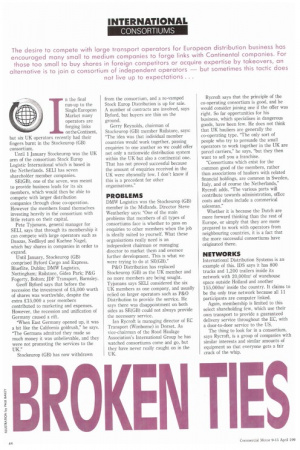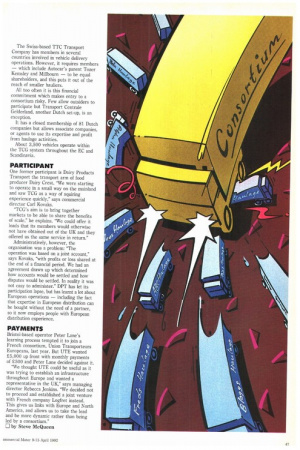INTERNATIONAL
Page 48

Page 49

If you've noticed an error in this article please click here to report it so we can fix it.
CONSORTIUMS
n the final run-up to the Single European Market many operators are forging links on the Continent, but six UK operators recently had their fingers burnt in the Stockeurop (GB) consortium.
Until 1 January Stockeurop was the UK arm of the consortium Stock Europ Logistic International which is based in the Netherlands. SELI has seven shareholder member companies.
SE(GB), one of the seven, was meant to provide business leads for its six members, which would then be able to compete with larger distribution companies through close co-operation. However the members found themselves investing heavily in the consortium with little return on their capital.
Pete Tyjsmans, general manager for SELI, says that through its membership it can compete with large operators such as Danzas, Nedlloyd and Kuehne Nagel, which buy shares in companies in order to expand.
Until January, Stockeurop (GB) comprised Byford Cargo and Express. Blueflite, Dublin; DMW Logistics, Nottingham; Railstore, Gidea Park; P&G Fogerty, Bolton; JDF Transport, Barnsley.
Geoff Byford says that before the recession the investment of £5,000 worth of shares was worthwhile, despite the extra £15,000 a year members contributed to marketing and expenses. However, the recession and unification of Germany caused a rift.
'When East Germany opened up, it was a bit like the California goldrush," he says. "The Germans admitted they made so much money it was unbelievable, and they were not promoting the services to the UK."
Stockeurop (GB) has now withdrawn from the consortium, and a re-vamped Stock Europ Distribution is up for sale. A number of contracts are involved, says Byford, but buyers are thin on the ground.
Gerry Reynolds, chairman of Stockeurop (GB) member Railstore, says: "The idea was that individual member countries would work together, passing enquiries to one another so we could offer not only a nationwide distribution system within the UK but also a continental one. That has not proved successful because the amount of enquiries received in the UK were abysmally low. I don't know if this is a precedent for other organisations."
PROBLEMS
DMW Logistics was the Stockeurop (GB) member in the Midlands. Director Steve Weatherley says: "One of the main problems that members of all types of consortiums face is whether to pass on enquiries to other members when the job is ideally suited to yourself. What these organisations really need is an independent chairman or managing director to market them and oversee further development, This is what we were trying to do at SE(GB)."
P&O Distribution has replaced Stockeurop (GB) as the UK member and no more members are being sought. Tyjsmans says SELI considered the six UK members as one company, and usually relied on larger operators such as P&O Distribution to provide the service. He says there was disappointment on both sides as SE(GB) could not always provide the necessary service.
Ian Rycroft is managing director of EC Transport (Wimborne) in Dorset. As vice-chairman of the Road Haulage Association's International Group he has watched consortiums come and go, but they have never really caught on in the UK, Rycroft says that the principle of the co-operating consortium is good, and he would consider joining one if the offer was right. So far opportunities for his business, which specialises in dangerous goods, have been few. He does not think that UK hauliers are generally the co-operating type. "The only sort of people who try to persuade the small operators to work together in the UK are parcel carriers," he says, "but they then want to sell you a franchise.
"Consortiums which exist for the common good of the members, rather than associations of hauliers with related financial holdings, are common in Sweden, Italy, and of course the Netherlands," Rycroft adds. "The various parts will contribute towards administration, office costs and often include a commerical salesman."
Whether it is because the Dutch are more forward thinking than the rest of Europe, or simply that they are more prepared to work with operators from neighbouring countries, it is a fact that the more successful consortiums have originated there.
NETWORKS
International Distribution Systems is an example of this. IDS says it has 800 trucks and 1,200 trailers inside its network with 20,000m` of warehouse space outside Holland and another 155,000m inside the country. It claims to be the only true network because all 11 participants are computer linked.
Again, membership is limited to this select shareholding few, which use their own transport to provide a guaranteed delivery service throughout the EC, with a door-to-door service to the US.
The thing to look for in a consortium, says Rycroft, is a group of companies with similar interests and similar amounts of equipment so that everyone gets a fair crack of the whip. The Swiss-based TIC Transport Company has members in several countries involved in vehicle delivery operations. However, it requires members — which include Autocar's parent Tozer Kemsley and Millbourn — to be equal shareholders, and this puts it out of the reach of smaller hauliers.
All too often it is this financial commitment which makes entry to a consortium risky. Few allow outsiders to participate but Transport Centrale Gelderland, another Dutch set-up, is an exception.
It has a closed membership of 81 Dutch companies but allows associate companies, or agents to use its expertise and profit from haulage activities.
About 3,500 vehicles operate within the TCG system throughout the EC and Scandinavia.
PARTICIPANT
One former participant is Dairy Products Transport the transport arm of food producer Dairy Crest. "We were starting to operate in a small way on the mainland and saw TCG as a way of aquiring experience quickly," says commercial director Carl Kayaks.
"TCG's aim is to bring together markets to be able to share the benefits of scale," he explains. "We could offer it loads that its members would otherwise not have obtained out of the UK and they offered us the same service in return."
Administratively, however, the organisation was a problem: "The operation was based on a joint account," says Kovaks, "with profits or loss shared at the end of a financial period. We had an agreement drawn up which determined how accounts would be settled and how disputes would be settled. In reality it was not easy to administer." DPT has let its participation lapse, but has learnt a lot about European operations — including the fact that expertise in European distribution can be bought without the need of a partner, so it now employs people with European distribution experience.
PAYMENTS
Bristol-based operator Peter Lane's learning process tempted it to join a French consortium, Union Transporteurs Europeans, last year. But UTE wanted £5,000 up front with monthly payments of £500 and Peter Lane decided against it.
"We thought UTE could be useful as it was trying to establish an infrastructure throughout Europe and wanted a representative in the UK," says managing director Rebecca Jenkins. "We decided not to proceed and established a joint venture with French company Logfret instead. This gives us links with Europe and North America, and allows us to take the lead and be more dynamic rather than being led by a consortium."
O by Steve McQueen




























































































